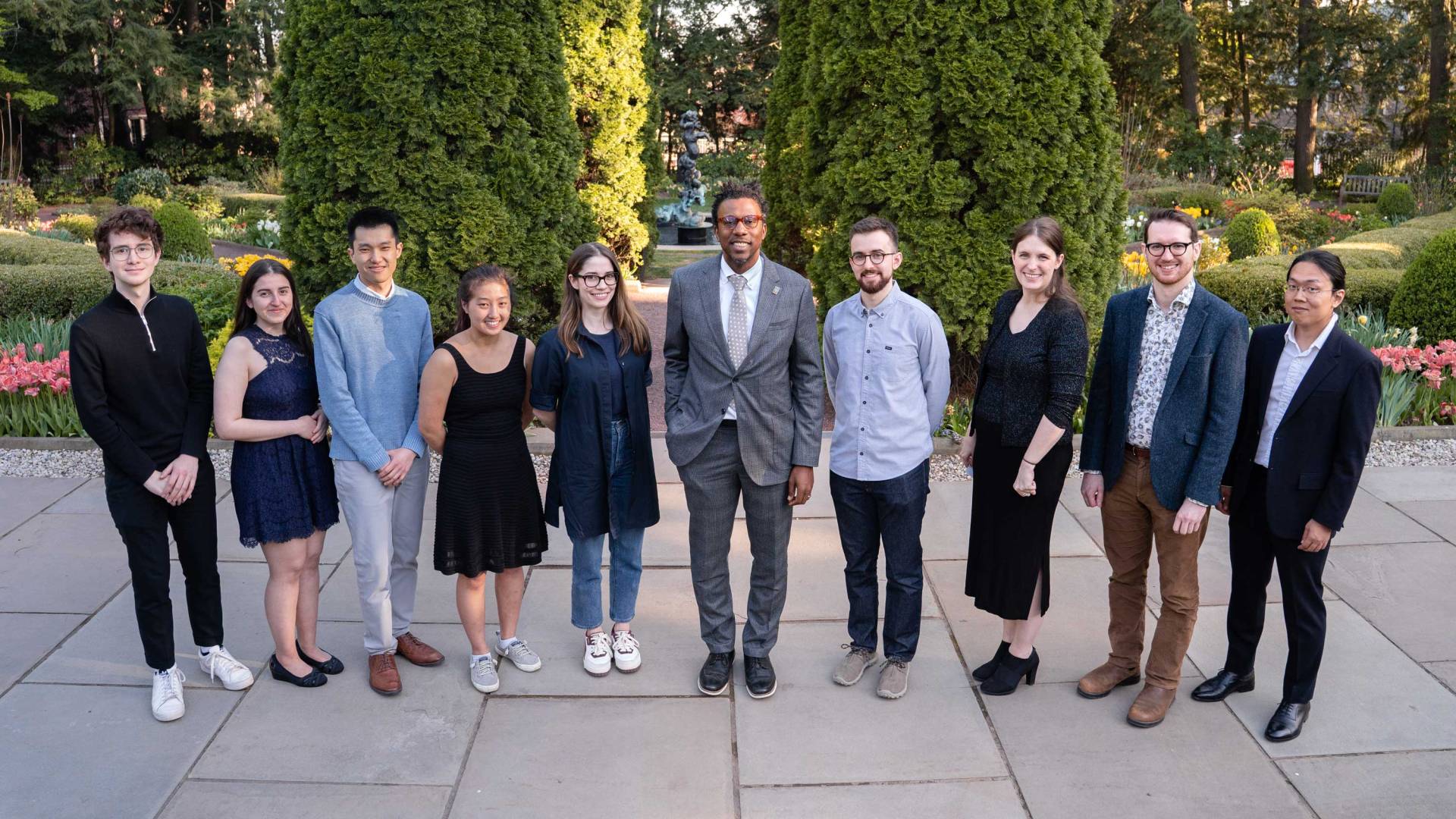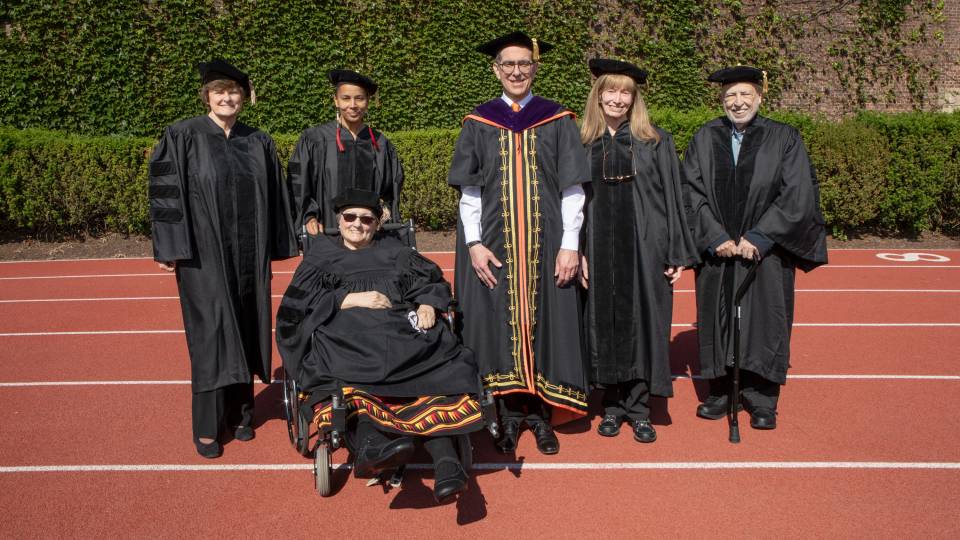The Graduate School has presented 10 graduate students with its annual Teaching Awards in recognition of their outstanding abilities as teachers.

Dean of the Graduate School Rodney Priestley (center) at the school’s Tribute to Teaching reception with awardees (left to right) Nicolas Hommel, Evelyn Navarro Salazar, William Wen, J Jessica Ye, Eleanor Gordon-Smith, Calvin Spolar, Hannah McLaughlin, Christopher Parton and Jeewon Yoo. Not pictured: Aaron Su.
Winners were selected by a committee chaired by Lisa Schreyer, deputy dean of the Graduate School, and composed of the academic affairs deans and staff from the McGraw Center for Teaching and Learning. The nominations were made by academic departments and programs. Each winner receives $1,000.
The awardees are Eleanor Gordon-Smith from the Department of Philosophy, Nicolas Hommel from the Department of Economics, Hannah McLaughlin from the Department of Music, Evelyn Navarro Salazar from the Department of Chemical and Biological Engineering, Calvin Spolar from the Department of Chemistry, Aaron Su from the Department of Anthropology, William Wen from the Department of Politics, and Jessica Ye from the Princeton Neuroscience Institute.
In addition, Christopher Parton from the Department of Music was honored with the Quin Morton Graduate Teaching Award for instructors in the Princeton Writing Program, and Jeewon Yoo from the Department of English was recognized with the Collaborative Teaching Initiative (CTI) Graduate Teaching Award.
Eleanor Gordon-Smith
Eleanor Gordon-Smith is expected to graduate in May with a Ph.D. in philosophy. She was nominated for her work as an student assistant in instruction (AI) in “Introduction to Moral Philosophy” and “Systematic Ethics.”
Professor of Philosophy Sarah McGrath recalls watching Gordon-Smith deliver “the most effective undergraduate lecture I have ever seen anyone give anywhere, ever, on any topic. I believe that I saw Princeton undergraduate students fall in love with philosophy there before my eyes that morning.”
Students commented that Gordon-Smith “exuded the kind of intelligence, confidence and warmth that made me cling onto every word she said while also being encouraged to contribute to the conversation. She created an environment that made tackling some of the most challenging moral dilemmas fun and exciting.” Others praised her patience and her ability to engage students in class discussions.
Nicolas Hommel
Nicolas Hommel, who is a third-year Ph.D. student in economics, was recognized for his work as a preceptor in “Econometrics: A Mathematical Approach,” taught by Assistant Professor of Economics Mikkel Plagborg-Møller.
It was Hommel’s first time as a preceptor, and he “absolutely hit it out of the park,” Plagborg-Møller said. “Nicolas’ dedication, deep insight into the material and gentle personality made his precepts an essential bulwark against the stress of my demanding lectures.”
Students were grateful to Hommel for his proactive assistance and well-organized material. One called him “the most helpful, patient and understanding preceptor I've had. He did not just give answers — he worked to make sure everyone understood the topics on a fundamental level. It would have been a much more difficult — and much less pleasant — class without him.”
Hannah McLaughlin
A fifth-year Ph.D. student in musicology, Hannah McLaughlin has served as an AI in “Introduction to Music” and “Music of the Romantic Era.” Now a seasoned preceptor, she took on added responsibility for several aspects of the course on the Romantic Era taught by Professor of Music and Slavic Languages and Literatures Simon Morrison.
“She took the lead in planning and organizing precepts, mentoring the other first-time preceptors, sharing her marvelously interactive power point presentations, and coming up with discussion topics and group activities ranging from exercises in re-composition to practice ear training sessions to mock debates about music and politics,” Morrison said.
McLaughlin was lauded for her inventiveness in getting students engaged. “Finding creative ways to deliver historical material comes so naturally to Hannah, because creativity and originality are integral elements of her personality,” one student wrote.
Evelyn Navarro Salazar
A second-year Ph.D. student in chemical and biological engineering, Evelyn Navarro Salazar was recognized for her work as a preceptor in “Mass, Momentum, and Energy Transport.”
Celeste Nelson, the Wilke Family Professor in Bioengineering, said Salazar “had an amazing rapport with the students” and was always available to answer their queries and provide feedback on their work. She was also “an incredibly talented and compassionate teacher,” Nelson said.
Students were grateful to Salazar for going “above and beyond in ensuring that we as students have all the resources to succeed and to love the subject. It is obvious that she has a deep appreciation and passion for the work she is doing.”
Christopher Parton
Christopher Parton is expected to graduate this year with a Ph.D. in musicology. He served as the Quin Morton ’36 Teaching Fellow in the Princeton Writing Program, teaching a writing seminar titled “Sound and the City” that examines what can be learned about a city’s history, community and ecology from listening to an urban environment.
Amanda Irwin Wilkins, director of the Princeton Writing Program, said Parton “empowers students to understand how, as apprentice scholars, their own arguments can join wider conversations at both the University and in public life.”
Parton “made sure each session was guided, and instead of taking over or sending me in a certain direction, he asked questions and posed challenges to get me thinking differently,” one student wrote.
Calvin Spolar
Calvin Spolar, who is a third-year Ph.D. student in chemistry, was a preceptor in “General Chemistry I” and “General Chemistry II.” “Calvin is not a grad student who teaches because he has to,” said Professor of Chemistry Michael Hecht. “Rather, he is passionate about teaching, and goes out of his way to find extra opportunities to teach.”
Students were grateful to Spolar for his quick email responses to queries and his clear explanations of the material. “Calvin is an amazing preceptor who always reaches out if he thinks you may need support and is overall just readily available at all times,” one student said. Another added, “I am always able to understand the material so much better after going to his precept.”
Aaron Su

Aaron Su
Aaron Su, who is a fourth-year Ph.D. student in anthropology, served as an AI for “Introduction to Anthropology” and “Medical Anthropology.” João Biehl, the Susan Dod Brown Professor and chair of the Department of Anthropology, described Su as “an extraordinarily talented anthropologist and a passionate educator” who has “reimagined the art of pedagogy as a way to transform students’ understanding of humanity and the contemporary world.”
Su’s clear lectures and availability to students outside of the classroom won praise. Wrote one student, “Aaron’s ability to be precise, sensible and approachable while thoughtfully answering my questions in office hours challenged me to think more critically about each of my course assignments and the way I approach anthropological writing more broadly.”
William Wen
A third-year Ph.D. student in politics, William Wen was recognized for his work as a preceptor in “Introduction to Quantitative Social Science.” “He was always enthusiastic, warm and effortlessly professional with the students and with me,” said Marc Ratkovic, an assistant professor of politics.
Those in his class remarked on Wen’s ability to make students feel comfortable asking questions and his willingness to go the extra mile to offer assistance. “I was simply amazed at the amount of time he spent on helping us, holding multi-hour office hours, and answering complex questions on Campuswire and over emails at all hours of the day,” one student wrote. “I am so grateful to him for helping me through the class.”
Jessica Ye
Jessica Ye, a second-year Ph.D. student in neuroscience, served as an AI for “Fundamentals of Neuroscience,” taught by Lisa Boulanger, an associate professor in the Princeton Neuroscience Institute. Ye was “a standout” preceptor because she was an innovator, according to Boulanger. “She thought of creative approaches to engage students while enhancing their learning, like playing ‘Neuroscience Jeopardy,’” Boulanger said. “Her precepts were so exceptional, I asked her if we could record them on Zoom.”
“She really knows her stuff,” wrote one student, who was grateful for the slides she created to help students visualize concepts. “I found that precepts provided exactly the interaction and reinforcement that I needed to better understand the material. Jessica brought energy and animation (quite literally) to material that was previously just words on a slide, and I appreciate all of the effort she put in to help us learn.”
Jeewon Yoo
Jeewon Yoo is expected to graduate this year with a Ph.D. in English. He served as the lead instructor for “Art of Comedy” and as an AI for “Sally Rooney and Her Contemporaries.”
Fintan O’Toole, Visiting Leonard Milberg ’53 Professor of Irish Letters, praised the way Yoo “communicated with confidence, charm and clarity. He engaged with the students in a way that was always lively, warm, and encouraging, but also challenging and stimulating.”
“Jeewon helmed the most vibrant class discussions I have ever had in my Princeton career,” said one student. “Whenever I spoke in class, he would continue to push my thinking, until I ended up with a profound idea I didn’t even know I was capable of formulating.”























